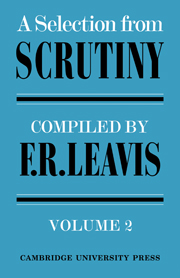3 - HENRY JAMES'S HEIRESS
The Importance Of Edith Wharton
Published online by Cambridge University Press: 04 August 2010
Summary
The unfinished posthumous novel of Edith Wharton just published should at least serve to bring up this author's name for evaluation. It is incidentally quite worth reading if you are an amateur of the period now in fashion again (the 'seventies). It would have been far more worth publishing if Mrs Wharton's literary executor had supplemented his appendix by a memoir and critical essay designed to introduce the present generation to her best work, scarcely ever read in England— for to the educated English public Mrs Wharton's novels are those of her last ten years and known vaguely as the kind of fiction which was published serially in Good Housekeeping. But her characteristic work was all done long before, early enough for one of her good novels to have been published in ‘ The World's Classics’ in 1936, more than thirty years after it was first printed. It was as the historian of New York society of the ’nineties that she first achieved character and eminence as a novelist, on the dual grounds, she said, that it was ‘a field as yet unexploited by any novelist who had grown up in that little hot-house of traditions and conventions’ and had been ‘tacitly regarded as unassailable’. In her rapid growth as combined social critic and historian she continued to strike roots outwards and downwards until she had included in her reach the lowest levels of rustic, urban and manufacturing life. And her work was no mere historical fictionizing, he was a serious novelist.
- Type
- Chapter
- Information
- A Selection from Scrutiny , pp. 124 - 136Publisher: Cambridge University PressPrint publication year: 1968



